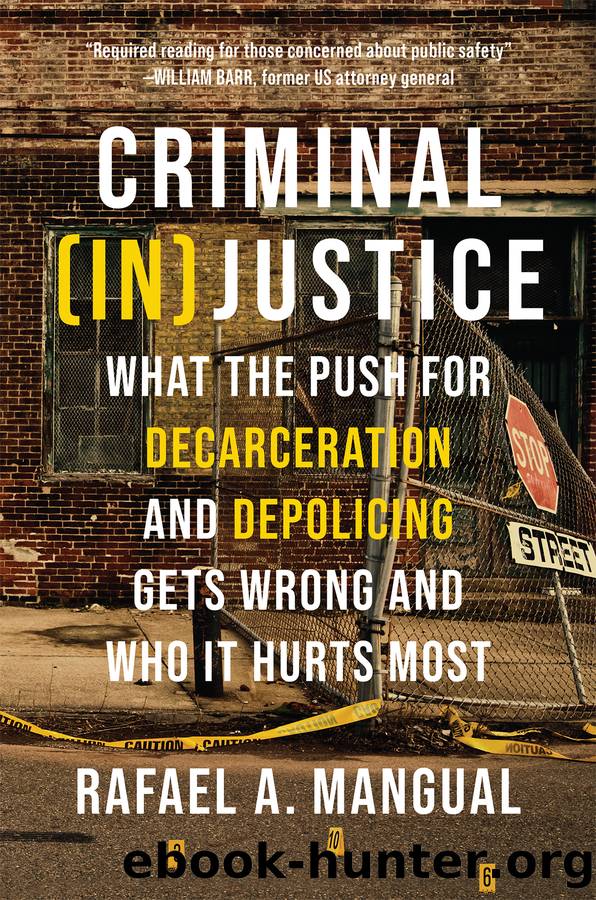Criminal (In)Justice by Rafael A. Mangual

Author:Rafael A. Mangual [A. MANGUAL, RAFAEL]
Language: eng
Format: epub
ISBN: 9781546001515
Publisher: Center Street
Published: 2022-07-26T00:00:00+00:00
FALSE POSITIVES AND THE CODE OF THE STREET
The false-positive problem, and what itâs thought to represent, has animated much of the antipathy expressed toward the institution of policing; it has inspired litigation, investigations, and reforms aimed at limiting police activityâparticularly in minority neighborhoods.
On a webpage titled âEnding Racist Stop and Frisk,â the Massachusetts chapter of the ACLU notes in a section of âkey factsâ that more than 200,000 of the police-civilian encounters initiated by Boston police âled to no arrest,â and that âonly 2.5% led to seizure of contraband.â3 Similar statistics were cited by those prosecuting the case against the NYPDâs stop-and-frisk practices during this centuryâs first decade. In an article purporting to prove that the criminal justice system is racist, the Washington Postâs Radley Balko cites a study finding that Black motorists were more likely than white motorists to be searched when stopped by police even though âwhites were more likely to be found with illicit drugs.â4
Being on the civilian side of a police encounter that turns out to be a false positiveâthat is, the encounter does not reveal evidence of a crimeâcan be both infuriating and deeply embarrassing. You can multiply those emotions by 10 when such encounters involve Black and brown men, which have been the subject of incredibly contentious debates about race and policing. The false-positive problem is perhaps the main contributor to the cloud of racial tension that hangs over many police interactions, because whenever a Black or brown male is stopped and frisked without the police finding any contraband, it contributes to the senseâwidely held in many sectors of American societyâthat the typical police officer, through his subscription to negative stereotypes and his own biases, views people of color as criminals. Right or wrong, such encounters are regularly seized on to make the case that policing is an institution imbued with racism.
In his book Code of the Streetâan ethnographic work (and one of the most important contributions to the sociological literature in my lifetime) that informs much of whatâs to come in this chapterâsociologist Elijah Anderson describes the disturbing phenomenon of Black men âalmost always [being] given extra scrutinyâ by sales personnel when shopping in nicer neighborhoods, illustrating âthe inability of some whites to make distinctionsâparticularly between people who are out to commit crime and those who are not.â5
And in 2016, Republican senator Tim Scott eloquently recounted on the Senate floor his own personal stories of being stopped and questioned by police pursuant to what turned out to be baseless suspicions that left him, as it does other Black men, âfeeling like youâre being targeted for nothing more than being just yourself.â6
When undergoing my own effort to think carefully about this problem, I remembered the stories at the top of this chapter and began to consider the following question: What if at least part of the false-positive problem isnât just driven by police acting on racial biases, but also by cops picking up on cues that Black and brown men are themselves purposefully putting
Download
This site does not store any files on its server. We only index and link to content provided by other sites. Please contact the content providers to delete copyright contents if any and email us, we'll remove relevant links or contents immediately.
The Secret History by Donna Tartt(19027)
The Social Justice Warrior Handbook by Lisa De Pasquale(12182)
Thirteen Reasons Why by Jay Asher(8883)
This Is How You Lose Her by Junot Diaz(6872)
Weapons of Math Destruction by Cathy O'Neil(6260)
Zero to One by Peter Thiel(5782)
Beartown by Fredrik Backman(5734)
The Myth of the Strong Leader by Archie Brown(5491)
The Fire Next Time by James Baldwin(5423)
How Democracies Die by Steven Levitsky & Daniel Ziblatt(5211)
Promise Me, Dad by Joe Biden(5139)
Stone's Rules by Roger Stone(5078)
A Higher Loyalty: Truth, Lies, and Leadership by James Comey(4946)
100 Deadly Skills by Clint Emerson(4911)
Rise and Kill First by Ronen Bergman(4775)
Secrecy World by Jake Bernstein(4738)
The David Icke Guide to the Global Conspiracy (and how to end it) by David Icke(4696)
The Farm by Tom Rob Smith(4500)
The Doomsday Machine by Daniel Ellsberg(4481)
